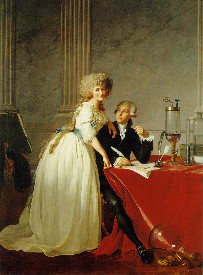Special Event: Oxygen
A play by Carl Djerassi and Roald HoffmannIn conjunction with the 2001 Sigma Xi Forum: Science, the Arts and the Humanities: Connections and Collisions
November 8 & 10, 2001, Fletcher Opera Theater
performed by the San Diego Repertory TheatreMore Information About the Play
Links to Reviews of the Play Oxygen
Antoine Laurent de Lavoisier and his Wife, 1788. Lavoisier was the father of the chemical revolution. His wife was an artist who studied with David, painter of the above portrait. She also illustrated Lavoisier's laboratory notes and translated English scientific papers.
Portrait by: David, Jacques-Louis
Scan by Mark HardenWhere the worlds of science and human emotion meet --- Oxygen.
Combine the talents of two renowned chemists with a passion for writing and theater and the result is Oxygen, a two-act play by Carl Djerassi and Roald Hoffmann. Directed by Bryan Bevell and performed by the San Diego Repertory Theatre, Oxygen will be presented as a fully staged professional production at Raleigh's new Fletcher Opera Theater. Hoffmann, the recipient of Sigma Xi's 2001 John P. McGovern Prize, is also a Nobel laureate in chemistry and the Frank H.T. Rhodes Professor in Humane Letters at Cornell University. Djerassi is a professor of chemistry at Stanford University, best known as developer of the oral contraceptive pill, and both scientists have published a range of other literary works including plays, such as Djerassi's An Immaculate Misconception that just opened in Manhattan at Primary Stages Theatre and has already been broadcast by the BBC and the World Service.Oxygen evolved from discussions between Hoffmann and Djerassi about a historical coincidence: In 1774, Joseph Priestley was a guest in Antoine Lavoisier's home, and the English minister described how he had made oxygen. At approximately the same time, Lavoisier received news of a similar discovery from Carl Wilhelm Scheele. While Priestley and Scheele remained unclear about what exactly they had discovered, Lavoisier was able to stake a claim to the discovery of the gaseous element responsible for the combustion of air. Hoffmann and Djerassi take the facts to develop a fictional encounter between the three claimants, bringing all three men and their wives together, at the invitation of King Gustav III, to Stockholm in 1777. The rest of the play shifts between the 18th-century characters, their process of science, politics and ambitions, and the Nobel committee's 21st century sensibilities as they argue about which of these men should be awarded the first "retro" Nobel Prize for chemistry.
Plays of scientific ideas are rare, however, the successful productions of Tom Stoppard's "Arcadia" and Michael Frayn's "Copenhagen," have engaged non-scientists and scientists in debates about the social implications of science. "Science is inherently dramatic ... " Djerassi says in his new book This Man's Pill (Oxford University Press), "... because it deals with the new and unexpected ... can 'science-in-theatre' also fulfill an effective pedagogic function on the stage or are pedagogy and drama antithetical?" Roald Hoffmann will introduce each performance of the play in Raleigh and lead a discussion about its broader implications.
Chemical and Engineering News
Nature
Los Angeles Times
Angewandte Chemie International EditionLinks to Roald Hoffmann
http://www.nobel.se/chemistry/laureates/1981/hoffmann-autobio.html
http://www.chem.cornell.edu/department/Faculty/Hoffmann/hoffmann.htmlLink to Carl Djerassi
http://www.djerassi.com/Link to Book Jacket
http://www.djerassi.com/oxygen/book/index.htmlLink to performances scheduled (several countries and languages)
http://www.djerassi.com/schedule/oxygen.html
